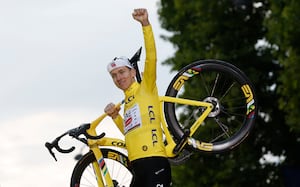It may be a long way from the cycling streets of Paris to the mountains and deserts of the UAE but one thing connected them this week – Sunday’s remarkable Tour de France victory of UAE Team Emirates-XRG's superstar, Tadej Pogacar. The 26-year-old Slovenian’s victory ride through the French capital to celebrate his fourth Tour win was well deserved, with one team colleague hailing him as a “once in a generation” talent.
Such an achievement should not come as a surprise to anyone who has witnessed the revolution that has taken place in UAE professional cycling in recent years. And although Pogacar’s undoubted abilities helped to earn him yet another accolade, Emirati cycling can also be proud of developing a sporting culture that embraces recreational riders as well as elite-level competitors.
On one hand, the story of professional cycling in the Emirates is one of vision and commitment leading to world-class outcomes. In a little over a decade, cycling tours in Dubai and Abu Dhabi evolved into today’s UAE Tour, which remains the only UCI WorldTour race in the Middle East. This race consistently attracts some of the best in world cycling, with competitors speeding across flat desert stretches and along city streets as well as tackling gruelling mountain climbs such as Jebel Hafeet and Jebel Jais.
Such success did not spring from nowhere; significant government and corporate backing for riders, organisers and cycling infrastructure as a whole has played a major part in this sporting story. But such support for cycling does not begin and end with the highest levels of men’s competition. In 2021, UAE Team ADQ became the first women’s professional cycling team in the Middle East, competing with 14 teams in Women’s World Tour races. Last December, it was announced that Abu Dhabi international investment entity XRG had entered a six-year partnership with UAE Team Emirates, a move that ensures Emirati cycling will remain competitive.
Although many foreign-born riders have represented the UAE with distinction, home-grown talent has also made its presence felt. Last year, Safiya Al Sayegh – the country’s first female professional cyclist – also become the first Emirati woman cyclist to qualify for the Olympics. Another trailblazer is Yousif Mirza who had the honour of becoming the first Emirati to compete in the road race event at the Rio Games in 2016, and last year travelled to the Paris Games as Al Sayegh's coach. Promising Emirati cyclists Abdullah Al Hammadi and Mohammad Al Mutaiwei are also ones to watch.
Parallel to these achievements has been the promotion of cycling in the Emirate as a whole. In the same year that the country’s first professional women’s team was founded, Abu Dhabi was distinguished as a Bike City by the Union Cycliste Internationale, the Switzerland-based governing body for international competitive cycling. This recognised the emirate’s commitment to the UCI’s Cycling for All strategy, which aims to promote cycling as a healthy, everyday activity, as a more sustainable means of transport, and as a competitive sport for amateurs and professionals.
Infrastructure projects in the capital also bear out this commitment. These include a new 109-kilometre designated cycling track called the Abu Dhabi Loop and a 3,500-seat velodrome, called the Velodrome Hudayriyat, currently being built on Hudayriyat Island. Dubai too has long embraced the bicycle; last May its Quality of Life Strategy 2033 included aims to increase the length of beach cycling tracks by 300 per cent and develop more than 115km of pedestrian and cycling tracks.
Back in Paris, Pogacar’s celebrations were proof that winning a Tour de Frances takes something extra special. But cyclists in the UAE – whether professional and amateur – can feel that they are also part of this tale with some among them primed to write the next chapters in this sporting story.




